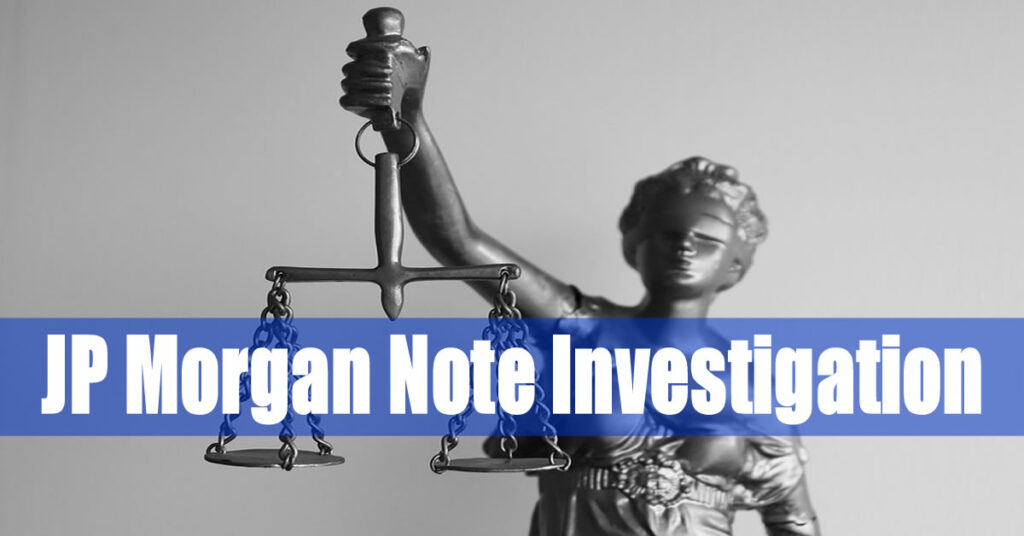Haselkorn & Thibaut is currently investigating client losses JPMorgan Chase Auto Callable Contingent Interest Notes Linked to the S&P GSCI® Crude Oil Index Excess Return (SPGCCLP). It is alleged that many of the products were recommended to their clients without disclosing the risk and disclosures. As a result, many investors with conservative risk profiles have experienced substantial losses.
Structured notes are made by mixing multiple financial instruments, including bonds, options, and derivatives. These products are tailored to the needs of individual investors and typically aim to give a certain risk-return profile. Equity-linked notes, reverse convertibles, and market-linked certificates of deposit are all forms of structured instruments. The risks associated with these complicated financial instruments are often sold to individual investors. The average investor may struggle to understand how these products function and the level of risk to which they are exposed due to the industry’s inherent complexities.
Do you suspect foul play by your broker-dealer or their representative in this transaction? In that case, you may be in a position to seek recovery of your losses through a Financial Industry Regulatory Authority (FINRA) arbitration claim against your broker-dealer.
Haselkorn & Thibaut’s seasoned structured notes lawyers represent bond buyers who bought the financial instruments from broker-dealers. Investors who structured notes can reach us online or by calling toll-free at 1-800-856-3352 for a free Structured Notes & Products Investor Guide and confidential consultation.
What is the JPMorgan Chase Auto Callable Contingent Interest Notes Linked to the S&P GSCI® Crude Oil Index Excess Return?
Table of Contents
The structured product referred to above is an illiquid, complex investment, considered as a risky venture, depending on risk tolerance level and financial goals, for inexperienced retail investors like retirees, and even for many a high net-worth experienced investor.
This product offers investors the possibility of earning contingent interest at rates higher than the market, subject to the underlying asset closing above the defined threshold on defined observation dates. The threshold operates like a benchmark for the investment performance of crude oil.
But there are risks. It is possible that the investor does not get any interest payout on some of the review dates. It is also entirely possible that the investor will lose some part of the principal.
With investors reporting losses rising, the concern is rising that the complex product might have been unsuitably sold to clients who should not have been a part of the target set because of their relative inexperience in investing and their low ability to tolerate risk. Some clients had also claimed that the risks of the product were misrepresented to them when the sale was being made.
A Structured Note explained
A packaged investment with traditional investments such as commodities, currencies, stocks, and even a basket of securities contains at least one derivative, called a Structured Product. The assets, typically, are linked to interest, with the payoff to customers being realized through the performance of one or more of the underlying assets.
Investment banks are the progenitors of these products, and many types of them are in use. On occasion, the structure can befuddle even hard-boiled investment bankers and brokers. Hence, they lend themselves well to omissions and misrepresentations when sold to retail or other inexperienced investors.
While generally meant for experienced investors, structured products can also be sold to retail investors. These products offer retail investors an opportunity to invest in derivatives which, in turn, could yield better returns than legacy investment choices such as stocks. They also present an opportunity to make investment bets that are more unconventional with a varied set of outcomes, depending on the product, such as limiting losses in return for limiting gains or certain defined outcomes.
Structured products will, generally, carry a higher sticker price in the form of broker commissions and fees.
Risks related to investing in structured notes that could lead to losses
- Generally less liquid than traditional investments, they are not easy to buy or sell when needed
- The risk of default is high
- A higher level of opacity
- A credit risk exposure on account of unsecured debt
- The risk of principal erosion for an investor
- Underlying derivatives also have a market exposure; hence market risk
Investor guidance for recovery of losses
The Haselkorn & Thibaut supports institutional investors and retail investors as they pursue claims for recovery of losses incurred in JPMorgan Chase Auto Callable Contingent Interest Notes Linked to the S&P GSCI® Crude Oil Index Excess Return. The focus of recovery is to pursue damage claims against broker-dealers and their financial advisors.
With Haselkorn & Thibaut, you get a team of skilled legal professionals who understand structured products and their risks and complexity. Our representatives have over a hundred years of rich experience in securities-related cases. We have recovered many millions of dollars for our investor clients through FINRA arbitration, mediation, and litigation.
Investors who structured notes can reach us online or by calling toll-free at 1-800-856-3352 for a free Structured Notes & Products Investor Guide and confidential consultation.


